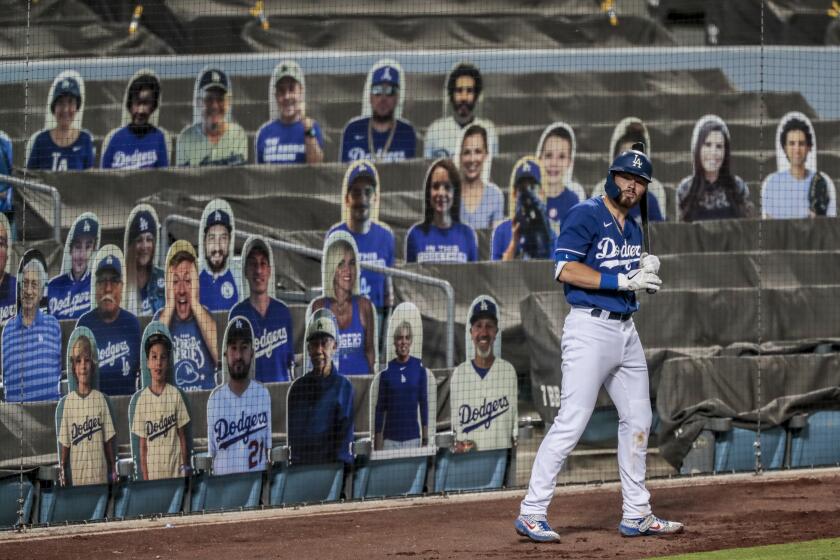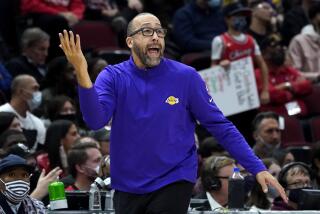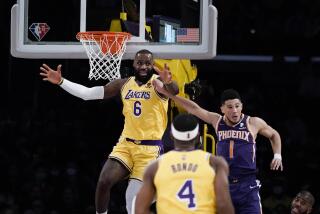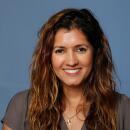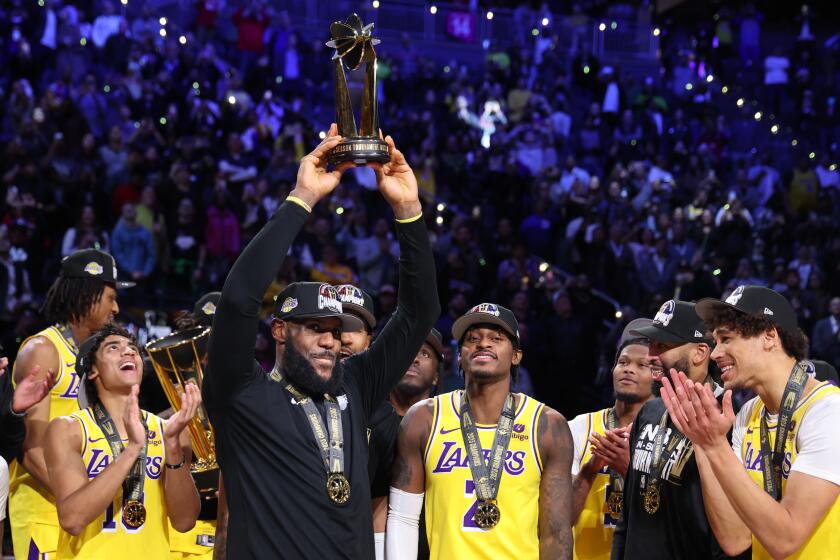NBA reacts to criticism of teams getting tested for coronavirus
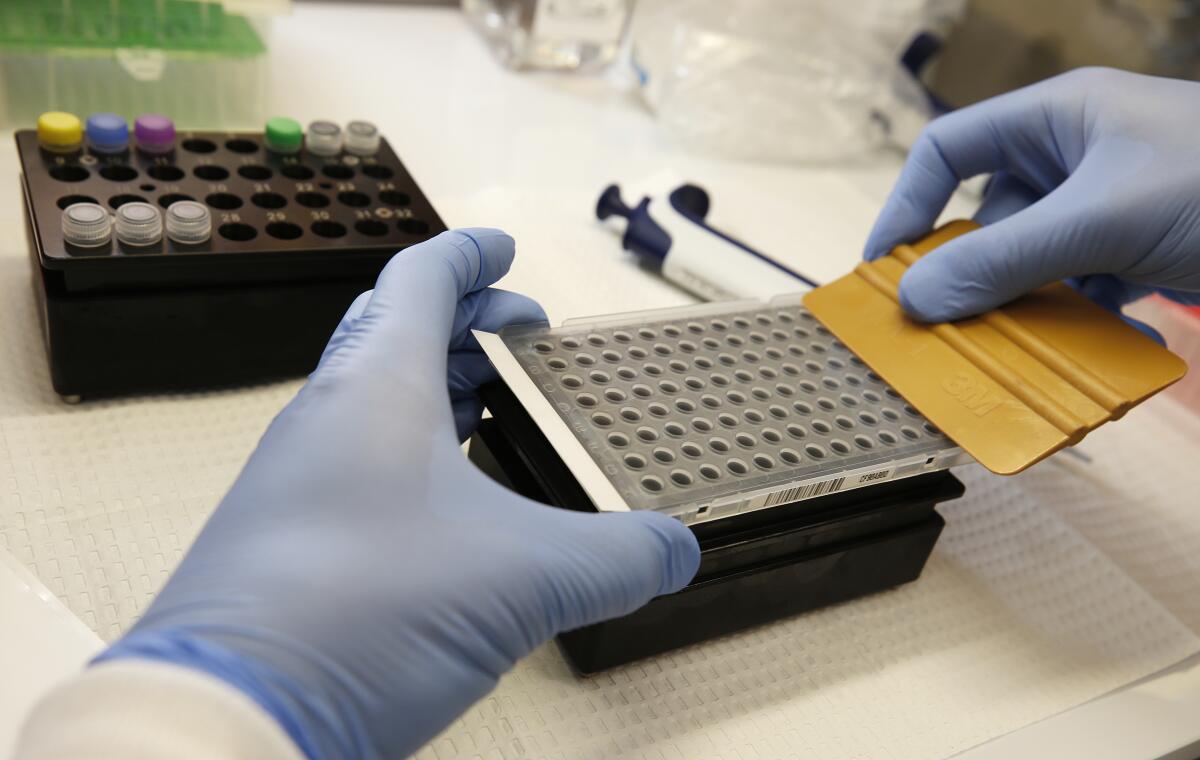
Eight NBA teams, including the Lakers, have offered coronavirus testing for their players since Utah Jazz center Rudy Gobert tested positive March 11, whether they have symptoms or not, providing them access to testing that isn’t available to the general public because of the shortage of coronavirus testing kits in the United States.
That fact has caused a backlash among people who wonder why NBA players without symptoms have access to testing when many others, even some who have symptoms, can’t get tested.
“We’ve been following the recommendations of public health officials,” NBA Commissioner Adam Silver said Wednesday in an interview on ESPN. “… We’ve had eight NBA teams — full teams — that have been tested now and members of other teams that were showing symptoms. And again, I understand from a public health standpoint why some people have reacted the way they did but I’d say from an NBA standpoint, we were following directives.”
Health officials have asked public clinics to limit testing to people with serious symptoms. Private clinics are not bound by similar restrictions, but they are encouraged to limit their testing to those with the most severe symptoms of COVID-19, the disease caused by this coronavirus. In Los Angeles County, as of Monday afternoon, only 1,100 people had been tested, which amounts to about .01% of the county’s population.
NBA teams, though, often have better access to advanced medical care. Once the league took steps to address the threat of coronavirus, it asked teams to create an arrangement with an infectious disease specialist with whom they could consult, and have a process in place for testing their players should the need arise.
When it was decided they needed to test their players, most teams paid for the tests to be administered and analyzed at private facilities. The Lakers, for example, partner with UCLA Health, which is also the sponsor for their training facility.
The Utah Jazz were an exception, with their traveling party and media members tested by Oklahoma state health officials once Gobert tested positive. Gobert’s test was also the catalyst for the league shutting down operations March 11.
“The Utah Jazz did not ask to be tested,” Silver said. “The Oklahoma public health official there on the spot not only required that they be tested, but they weren’t allowed to leave their locker room which was for at least four hours after the game where they had to stay, masks on, in the locker room. They couldn’t leave until health authorities had tested them.”
The NBA released a statement Tuesday that said players were more at risk of causing the virus to spread more quickly because of frequent travel, often by private plane and in private terminals, and because of their frequent interactions with the public.
The Brooklyn Nets, Toronto Raptors, Boston Celtics, Oklahoma City Thunder and Jazz have all announced that their teams were tested. Four players tested positive for the Nets, who played the Lakers on March 10, which was each team’s final game before the season was suspended indefinitely. Three of the Nets players who tested positive for COVID-19 were asymptomatic.
“We wish them a speedy recovery,” New York Mayor Bill de Blasio said on Twitter. “But, with all due respect, an entire NBA team should NOT get tested for COVID-19 while there are critically ill patients waiting to be tested. Tests should not be for the wealthy, but for the sick.”
Stories examining the impact the spread of the coronavirus has had on the NBA, NHL, MLB, the NCAA tournament and the rest of the sports world.
Dr. Jonathan Fielding, a professor of health policy and management at UCLA who served as the public health director and a health officer for Los Angeles County for 16 years, thinks another ethical issue on the horizon could be a bigger deal.
“That is certainly an issue,” Fielding said of the reaction to NBA players being tested despite a shortage of testing kits. “If we had to ration tests that would really be a big issue, but it was more kind of hit or miss, it was a limited amount of tests available and it just happens to be who you know. …
“I think what’s probably more an issue of rationing is what happens if we run out of ICU beds or what happens if we run out of ventilators. That’s the huge ethical issue. I would expect and hope that the players would be categorized no differently than people in their age group and medical conditions.”
Not every team has jumped at the chance for testing. The Sacramento Kings and Golden State Warriors both opted against full-scale testing because so few tests are being administered, though the number is growing every day in California.
“We’re in the same boat as everybody,” Warriors coach Steve Kerr said on a conference call Tuesday. “It’s very difficult to find a test in California and many places, so if any of our players do come down sick or any of our employees, we’ll [do] our best to get a test, but there’s definitely frustration that we don’t all have access to them, but there’s nothing we can do about it. So we just have to follow the advice of the medical experts and our local officials and leaders and do our best.”
The Lakers, though, immediately made plans to test any player who wanted to undergo COVID-19 testing after learning of the Nets’ positive tests. They had offered that to their players before, according to people familiar with the situation not authorized to speak publicly, but on Wednesday morning most of the team underwent testing at the team facility before entering a 14-day period of self-quarantine.
The Lakers did not announce they were testing their team, but rather simply said they were following protocols established in consultation with health officials.
It is unclear whether the Lakers will make public the results of their tests anonymously, as some teams have. Some players, like Nets forward Kevin Durant and Jazz guard Donovan Mitchell, have gone public with their positive tests.
The league hopes that helps raise awareness.
“I understand there are many sides to these issues,” Silver said. “But I also think that by virtue of an NBA player being tested and the kind of attention it brought, my sense was — especially among young people in the United States — people were not taking these protocols all that seriously until the NBA did what it did.”
Staff writers Broderick Turner and Andrew Greif contributed to this report.
More to Read
All things Lakers, all the time.
Get all the Lakers news you need in Dan Woike's weekly newsletter.
You may occasionally receive promotional content from the Los Angeles Times.
